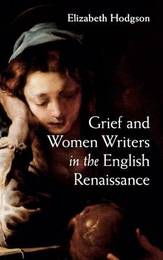
|
Grief and Women Writers in the English Renaissance
Hardback
Main Details
| Title |
Grief and Women Writers in the English Renaissance
|
| Authors and Contributors |
By (author) Elizabeth Hodgson
|
| Physical Properties |
| Format:Hardback | | Pages:206 | | Dimensions(mm): Height 231,Width 152 |
|
| Category/Genre | Literary studies - c 1500 to c 1800 |
|---|
| ISBN/Barcode |
9781107079984
|
| Classifications | Dewey:820.9928709031 |
|---|
| Audience | | Professional & Vocational | |
|---|
| Illustrations |
3 Halftones, unspecified
|
|
Publishing Details |
| Publisher |
Cambridge University Press
|
| Imprint |
Cambridge University Press
|
| Publication Date |
20 November 2014 |
| Publication Country |
United Kingdom
|
Description
Grief and Women Writers in the English Renaissance anatomizes the era's powerful but troubling links between the forgettable dead and the living mourners who are implicated in the same oblivion. Four major women writers from 1570 to 1670 construct these difficult bonds between the spectral dead and the liminal mourner. Mary Sidney Herbert, Countess of Pembroke, reinvents the controversial substitutions of aristocratic funerals. New Protestant ideologies of the sainted dead connect devotional mourning and patronage in Aemelia Lanyer's writing. Mary Wroth's verse enacts a uniquely exalted, imaginative melancholy in which Jacobean subjects dissolve into their mourning artifacts. Among the precarious political mourners of the later half of the period, Katherine Philips's lyric verse plays the shell game of private grief. Forgetting, being forgotten, and being dead are risks that the dead and the living ironically share in these central texts by the English Renaissance's most illustrious women writers.
Author Biography
Elizabeth Hodgson is Associate Professor at the University of British Columbia. Her articles have been published in Milton Studies, Studies in English Literature, Early Modern Literary Studies, Prose Studies, Women's Writing, and Medieval and Renaissance Drama in England.
Reviews'... notable for the sensitivity of its close readings ...' Scott Wayland, Notes and Queries
|